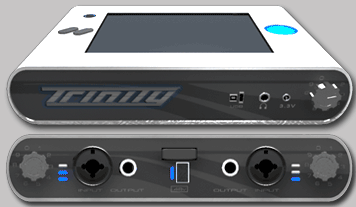
UPDATED: I’ve gotten additional details straight from the source, with specifics on specs, design concept, and software from the Trinity device’s creators; see our updated report.
LinuxDevices.com has an extended report on a new all-in-one recording device built with Linux; it’s been met by skeptical readers at Engadget and Music thing. There’s little point in spending a whole lot of energy now worrying about this product as it’s right now only a series of product renderings and a largely vague website. It’ll probably appeal to someone, with a large, built-in LCD screen, portable form factor, integrated XLRs, and the ability to run Linux audio software, and while US$999 MSRP sounds high, there are other recording workstations in that ball park without the software features. But would-be buyers are understandably unenthusiastic given they can simply opt for a laptop or tablet. Yes, that’s less mobile — but it’s also far more capable, and for many users, that’s well worth a little extra space.
Then again, you might want to look beyond this product alone. There are many reasons to be skeptical about the Trinity box, but the more interesting story here is that this could be the first of many mobile music and audio devices to run chips from ARM and TI and the Linux OS.
Trinity vs. Other Devices
Lately, product creators from large and small manufacturers seem to like to ignore existing products that work, like, say, laptops. Trinity Audio’s Ronald Stewart says to LinuxDevices, “What if you don’t have $300,000 to make a song? We want to let you record and mix a masterpiece on the bullet train in Tokyo.” It seems like a laptop would be a natural tool for the job, and indeed, while I’m not sure it’s a “masterpiece,” at least one Black Eyed Peas song really was recorded on a Shinkansen, with a Mac laptop and Reason.
The Trinity box will have to compete with dedicated field recorders starting much cheaper (albeit without XLRs) around US$400, more expensive dedicated recorders with proven reliability and pro features like SMPTE, new ultra-portable Windows boxes with better computer specs and compatibility with a range of audio interfaces and software, and, most of all, laptops, which provide easier interfaces and broader software compatibility with Windows, Mac, and Linux. I’ll be interested to see this actually ship, but it will face an uphill battle. October is AES season, so maybe we’ll see it then.
Other Mobile Devices in Store?
That said, I think the real story here isn’t the Trinity per se, but some growing tech trends. First, many devices are likely to forgo standard Intel chips for processors geared for mobile devices. The Trinity uses an ARM chip but still runs Linux; Texas Instruments, whose chips are in many audio devices you already use, is making a big play for Intel’s business. Add to that free embedded Linux licenses as opposed to pricey Windows licenses (and the fact that Windows is generally less flexible when it comes to embedded and mobile applications), and I think many more interesting products are in store. We’ve already seen the Korg OASYS running a modified Linux; LinuxDevices points to a new monitoring device for musicians from Glyph and upcoming Linux-based video recorders from Neuros. (I talked to Neuros’ CEO and he confirmed they’re making the move to Linux.)
So here’s the missing piece: software. Audacity is a mediocre wave editor to begin with, and even less suited to a mobile device. It seems to me that there’s a real opportunity for someone to start developing new apps with the mobile audio market in mind, from podcasters to musicians. Build a Linux app with a clean interface for mobile work and some creative features, and you could have this market to yourself. In fact, even if no one delivers dedicated hardware that people like, the app could run on custom laptops and ultra-portable PCs.
What would your dream mobile device look like? Or are you happy enough with laptops?
In other news, this whole product has unfortunately led to mostly-pointless debates over the merit of the Linux OS. I don’t think the Trinity hardware is the best device to use as an example in a Linux audio debate, but it has led to hilarious quotes, like this one from Music thing: “Linux is for people who buy Habitat furniture, listen to James Blunt and vote for the Liberal Democrats.” Sounds like the start of a great Linux switcher ad.